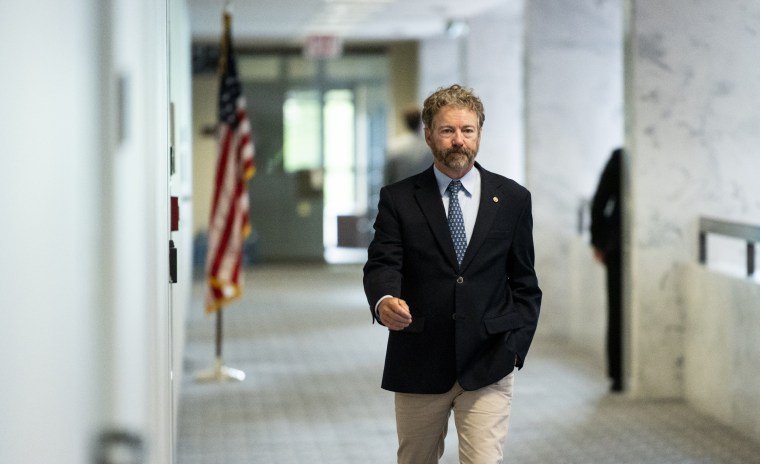In early March, as the coronavirus crisis was first coming into focus in the United States, Congress approved a modest $8.3 billion emergency bill. The bipartisan measure passed the Senate 96 to 1 -- and Sen. Rand Paul (R-Ky.) was the lone opponent.
It was an early indication that when it came to the deadly pandemic, Kentucky's junior Republican senator was likely to stand out.
More than two months later, Rand Paul is still getting out on limbs by himself.
Sen. Rand Paul, R-Ky., told reporters Tuesday that the amount of people who have died from COVID-19 in New York City would have been as high as it currently is, regardless of what precautions had been taken there. "I think New York would have lost about the same amount of people whether they did anything or not," Paul told reporters after he heard testimony from Dr. Anthony Fauci to the Senate Health, Education, Labor and Pensions Committee.
Of course, this is completely at odds with everything we've heard from actual epidemiological experts, but the GOP senator and failed presidential candidate doesn't seem overly impressed with the nation's leading authorities.
Rand Paul said at yesterday's committee hearing yesterday, for example, "I think we ought to have a little bit of humility in our belief that we know what's best for the economy. And as much as I respect you, Dr. Fauci, I don't think you're the end-all, I don't think you're the one person that gets to make a decision. We can listen to your advice, but there are people on the other side who are saying there's not going to be a surge and that we can safely open the economy."
Fauci responded, "I have never made myself out to be the end-all and only voice in this. I'm a scientist, a physician, and a public health official. I give advice according to the best scientific evidence."
Nevertheless, Paul had quite a bit to say yesterday, arguing that he doesn't expect a surge in coronavirus cases, the crisis has been "relatively benign" outside of "New England," and school closings have been "kind of ridiculous."
I'm going to assume the Senate Republican is confused about which states are actually in New England. It also seems likely that he hasn't seen the latest information about the role children play in transmitting the virus.
Paul added, "The history of this, when we look back, will be of wrong prediction after wrong prediction after wrong prediction."
Speaking of wrong predictions, watching the Kentucky lawmaker yesterday, it was hard not to reflect on a similar display from Rand Paul during a public-health emergency in 2014 -- except at that time, instead of trying to downplay a viral threat, the GOP senator was doing the exact opposite.
As longtime readers may recall, in the fall of 2014, with public anxieties over Ebola growing, Rand Paul started making appearances on right-wing radio programs, questioning Ebola assessments from the experts, blaming "political correctness," and raising threats that seemed plainly at odds with the facts. At one point, he asserted without proof that the authorities were deliberately misleading Americans about the virus.
At the time, it was Dr. Anthony Fauci who had to reassure the public that Rand Paul's rhetoric wasn't true.
With a track record like this one, perhaps the senator should, to borrow a phrase, show "a little bit of humility."
